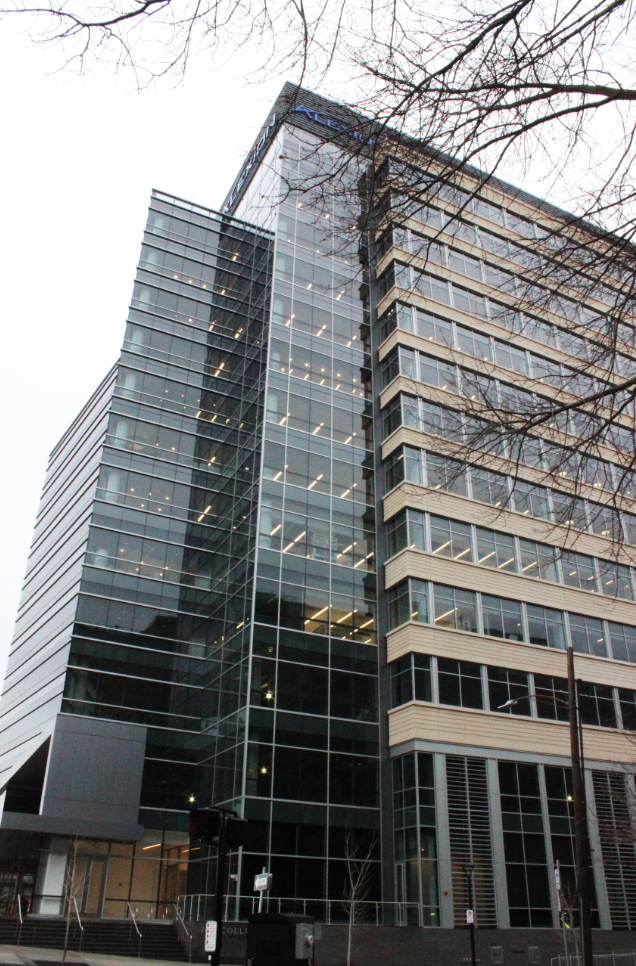
Alexion — a pharmaceutical company that relocated to New Haven last month — announced its 2015 financial results Wednesday morning, revealing revenues of $2.604 billion.
With this year-end result, Alexion increased its revenues by 21 percent over the past year, having earned $2.146 billion in 2014. CEO David Hallal said the company expects revenues to continue growing by around 20 percent in the upcoming year. Hallal forecasted the company’s 2016 year-end totals to reach $3.17 to $3.22 billion. The company, which specializes in rare metabolic disorders, launched two drugs for pediatric diseases this year, but still relies on revenue from its trademark drug, Soliris. This compound, which treats the life-threatening and blood-destroying disease paroxysmal nocturnal haemoglobinuria, brought in $2.59 billion — over 99 percent of total revenue.
“Beyond, in 2016, we will accelerate [earnings per share] growth through Soliris and our rare-metabolic-disease franchise,” Hallal said.
Strensiq, which the Food and Drug Administration approved in October 2015, helps babies and young children with hypophosphatasia — a genetic disease that prevents bone formation, leads to muscle weakness and kills infants. When given to affected babies, Strensiq leads to sufficient bone healing so that infants can walk like their peers, Hallal said. He added that the company is expecting slow and steady growth in the drug’s sales — approved in the U.S., European Union, Japan and Canada.
In December 2015, the FDA also approved Kanuma, the second of the two pediatric drugs released this year. The drug treats lysosomal acid lipase deficiency — a disease that leads to fatal fat build-up in organs and affects 25 in every one million people, according to British nonprofit Heart UK. Clinical trials show that 67 percent of treated babies survive for at least one year, Hallal said.
This year, Alexion will target markets in the U.S. and Germany, two of the 50 countries in which the company sells its drugs, Hallal said. He added that the company expects to launch or obtain FDA approval for six new products by 2018.
The company is now conducting clinical trials for the six new products, Executive Vice President and Global Head of Research & Development Martin Mackay said. ALXN1210, one of the drugs the company deems promising, treats PNH by lowering levels of lactate dehydrogenase, which is high in patients with PNH and indicates tissue death, muscle injury or blood flow deficiency. During the trials, Alexion researchers saw 88 and 85 percent reductions of LDH in three weeks of treatment, Mackay said.
Along with the AXLN1210 trial, Alexion is currently testing ALXN1101, which treats molybdenum cofactor deficiency type A — a disease marked by seizures, brain dysfunction and neuronal atrophy — in infants up to 28 months old. Other up-and-coming medications include SBC-103 for treatment of mucopolysaccharidosis IIIB, which causes speech and behavior problems in children. The company is also testing eculizumab, which treats generalized Myasthenia Gravis, a disease causing chronic muscle weakness.
Alexion officials said despite sales delays in some countries, they still expect to see high revenues in 2016.
“We had a $15 million impact in Brazil by the year’s end, even though government restrictions delayed orders,” CFO and Executive Vice President Vikas Sinha said. “We think that business as usual will continue in 2016.”
If business does continue as usual, Alexion will be on track to earn a hefty profit. Fourth-quarter 2015 earnings — $701 million — boosted Alexion’s year-end total by accounting for more than a quarter of 2015 revenue.
Stock prices spiked yesterday after Alexion conducted its 10 a.m. call. The share prices, which opened at $132.50, jumped to a high of $147.30 at the conclusion of the conference call. The price closed at $145.97 Wednesday.
Alexion’s new global headquarters are located on 100 College St.







